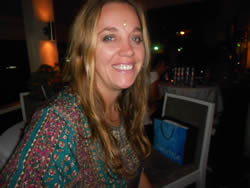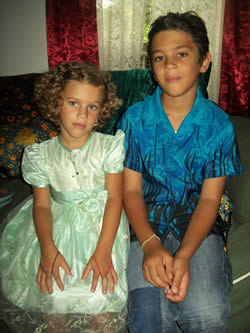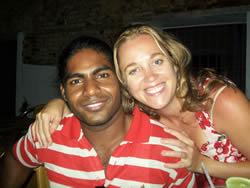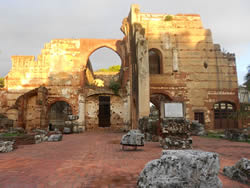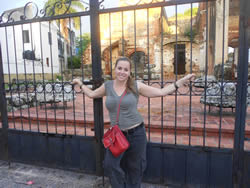- Home » Expat Articles » Interviews » Expat Interview With Eliza - USA to Domincan Republic
Expat Blog Awards 2013 - Contest concluded. Read all 171 Expat Top Lists or see the Prize/Award Winners
Expat Interview With Eliza - USA to Domincan Republic
| Published: | 4 Jan at 3 PM |
Want to get involved?
Become a Featured Expat and take our interview.
Become a Local Expert and contribute articles.
Get in touch today!
Become a Local Expert and contribute articles.
Get in touch today!
Filed: Interviews,Dominican Republic
Eliza Alys Young, had dreamed all her life of living in another country, speaking another language, and experiencing another culture. Finally, in 2002, her opportunity came when she went to the Dominican Republic to teach summer classes in web design. Her class was so popular that the students convinced her to visit the capital, Santo Domingo to meet with various businesses and explore opportunities of working together. Soon, she realized it was actually achievable to move there and 8 months later, that is exactly what she did.
Eliza, aka CreativEliza, is a free spirit, world traveler, creative expert, and part of multicultural family… Eliza shares her time between the US, Dominican Republic and beyond. When she is not caring for her high-energy kids, writing for her blog called Amor y Sabor (see listing here), creating art or cooking up a storm, she is designing for her own company, Design Intense.
Where are you originally from?
I am American born in Massachusetts but I grew up in New York City.
In which country and city are you living now?
Santo Domingo, Dominican Republic
How long have you lived here and how long are you planning to stay?
I have lived here since 2003 but in 2009 I re-established residency back in the United States because it was better for my children to go to school there. I am completing the process of a residency visa for my husband and if all goes well we will go to the United States shortly.
Why did you move and what do you do?
I am a designer in print and web. I first came to the Dominican Republic to teach summer classes at Altos de Chavón, an art school that partners with Parsons in NYC. My classes, in Web Design and Interface Design was attended by professionals as well as students and I was encouraged to consider moving to the Dominican Republic. I extended my stay and visited the capital, Santo Domingo, and realized I could do business there. I had always wanted to live in another country so this was my chance.
Did you bring family with you?
I brought my dog, which was my only family at the time, but I made a family in the Dominican Republic. I married a Dominican (now divorced) and had two children which were both born in Santo Domingo.
How did you find the transition to living in a foreign country?
It was a tremendously difficult at first because my Spanish was not very good and the expat friends I had in the Dominican Republic were all too busy to help me when I first moved. I needed help finding an apartment, setting up a bank account and learning my way around. If I was to do it again, I would want a friend who had the time to really show me the ropes and introduce me to the right people.
Was it easy making friends and meeting people; do you mainly socialise with other expats?
I met a lot of people through the work I do as a designer but it was hard to make friends. As a foreign woman, whether married or single, I was a threat to Dominican women and a target of Dominican men. I did have a group of expats that I became friends with but one by one they all left.
What are the best things to do in the area; anything to recommend to future expats?
If you love to dance to Latin music then the Dominican Republic is a great place to be. There is music everywhere so you don't need to go to a bar or a disco. You just need to travel in groups to stay safe and keep people from bothering you too much.
What do you enjoy most about living here?
I love how happy the people are despite the challenges of third-world living. There is a sense of the unexpected in daily life and that I find thrilling.
How does the cost of living compare to home?
For a single person the cost of living is lower if you are willing to adjust to different conditions that a third world country brings. But if you have children, the cost can be higher depending on their age and how you want them educated. I found that to live in the capital on a middle class level, even on the lower end, cost me about $3000 per month just to cover expenses. This was to educate two children in a bilingual school, live in a nice but not fancy neighborhood, have power and water backup, and some household help. Except for the household help, I can get way more for my money in the States. But, a single person can live much more modestly and with more freedom. The biggest economic advantages I see here for foreigners is the cost of healthcare and young child care.
What negatives, if any, are there to living here?
It is a third-world country so there are many negatives! Power and water outages, trash on the streets, crazy traffic, corruption, you name it. But that is part of what you sign up for when you come. You can't look at this country through the eyes of a more developed country, you have to embrace the life here both good and bad.
If you could pick one piece of advice to anyone moving here, what would it be?
Open a bank account right away and only carry a small amount of local cash (pesos). Reach out to other expats to learn from them. Be very reserved with Dominicans, especially of the opposite sex, until you have known them for a long time. Remember that as a foreigner you are seen as an opportunity first and a person second.
What has been the hardest aspect to your expat experience so far?
Honestly I have had a love/frustration experience here. The hardest part was that I had to realized eventually that I couldn't economically afford to stay and raise my children at the educational and economic level that I could in the U.S.. I resisted moving back and still wish I didn't have to.
When you finally return home, how do you think you'll cope with repatriation?
I moved my children back to Florida in 2010 and have been traveling back and forth to the Dominican Republic since then as I await the approval of a visa for my husband to emigrate to the United States. It has been a challenge to be back in the United States. On the one hand, life is much easier. Everything works: power, water, phones, traffic lights… the streets are clean, the police are trustworthy, it is like being in a resort compared to the Dominican Republic. But, life is also predictable, boring, planned and without panache. I miss the insanity, the vitality and the feeling of not really getting it but wanting to try anyway.
What are your top expat tips for anyone following in your footsteps?
Tell us a bit about your own expat blog.
My circumstances are unusual in that I have not one but two foreign cultures in my family. My expat experience is in the Dominican Republic and my children are half Dominican. But I met my husband in the Dominican Republic and he was also an expat but from India. Now we relocated in the United States but the three cultures intertwine. My blog is about this unusual combination of cultures, influences and perspectives.
How can you be contacted for further advice to future expats coming to your area?
Although I am not located as a resident in the Dominican Republic any longer I am still very connected to the area. Contact me via my Twitter @creativeliza and my Facebook page
Eliza blogs at http://amorysabor.com/ which we recommend a quick visit if you haven't been already. Amor y Sabor has an ExpatsBlog.com listing here so add a review if you like! Eliza also runs her design company called Design Intense. If you appreciated this interview with Eliza, please also drop her a quick comment below.
Eliza, aka CreativEliza, is a free spirit, world traveler, creative expert, and part of multicultural family… Eliza shares her time between the US, Dominican Republic and beyond. When she is not caring for her high-energy kids, writing for her blog called Amor y Sabor (see listing here), creating art or cooking up a storm, she is designing for her own company, Design Intense.
Here's the interview with Eliza...
Where are you originally from?
I am American born in Massachusetts but I grew up in New York City.
In which country and city are you living now?
Santo Domingo, Dominican Republic
How long have you lived here and how long are you planning to stay?
I have lived here since 2003 but in 2009 I re-established residency back in the United States because it was better for my children to go to school there. I am completing the process of a residency visa for my husband and if all goes well we will go to the United States shortly.
Why did you move and what do you do?
I am a designer in print and web. I first came to the Dominican Republic to teach summer classes at Altos de Chavón, an art school that partners with Parsons in NYC. My classes, in Web Design and Interface Design was attended by professionals as well as students and I was encouraged to consider moving to the Dominican Republic. I extended my stay and visited the capital, Santo Domingo, and realized I could do business there. I had always wanted to live in another country so this was my chance.
Did you bring family with you?
I brought my dog, which was my only family at the time, but I made a family in the Dominican Republic. I married a Dominican (now divorced) and had two children which were both born in Santo Domingo.
How did you find the transition to living in a foreign country?
It was a tremendously difficult at first because my Spanish was not very good and the expat friends I had in the Dominican Republic were all too busy to help me when I first moved. I needed help finding an apartment, setting up a bank account and learning my way around. If I was to do it again, I would want a friend who had the time to really show me the ropes and introduce me to the right people.
Was it easy making friends and meeting people; do you mainly socialise with other expats?
I met a lot of people through the work I do as a designer but it was hard to make friends. As a foreign woman, whether married or single, I was a threat to Dominican women and a target of Dominican men. I did have a group of expats that I became friends with but one by one they all left.
What are the best things to do in the area; anything to recommend to future expats?
If you love to dance to Latin music then the Dominican Republic is a great place to be. There is music everywhere so you don't need to go to a bar or a disco. You just need to travel in groups to stay safe and keep people from bothering you too much.
What do you enjoy most about living here?
I love how happy the people are despite the challenges of third-world living. There is a sense of the unexpected in daily life and that I find thrilling.
How does the cost of living compare to home?
For a single person the cost of living is lower if you are willing to adjust to different conditions that a third world country brings. But if you have children, the cost can be higher depending on their age and how you want them educated. I found that to live in the capital on a middle class level, even on the lower end, cost me about $3000 per month just to cover expenses. This was to educate two children in a bilingual school, live in a nice but not fancy neighborhood, have power and water backup, and some household help. Except for the household help, I can get way more for my money in the States. But, a single person can live much more modestly and with more freedom. The biggest economic advantages I see here for foreigners is the cost of healthcare and young child care.
What negatives, if any, are there to living here?
It is a third-world country so there are many negatives! Power and water outages, trash on the streets, crazy traffic, corruption, you name it. But that is part of what you sign up for when you come. You can't look at this country through the eyes of a more developed country, you have to embrace the life here both good and bad.
If you could pick one piece of advice to anyone moving here, what would it be?
Open a bank account right away and only carry a small amount of local cash (pesos). Reach out to other expats to learn from them. Be very reserved with Dominicans, especially of the opposite sex, until you have known them for a long time. Remember that as a foreigner you are seen as an opportunity first and a person second.
What has been the hardest aspect to your expat experience so far?
Honestly I have had a love/frustration experience here. The hardest part was that I had to realized eventually that I couldn't economically afford to stay and raise my children at the educational and economic level that I could in the U.S.. I resisted moving back and still wish I didn't have to.
When you finally return home, how do you think you'll cope with repatriation?
I moved my children back to Florida in 2010 and have been traveling back and forth to the Dominican Republic since then as I await the approval of a visa for my husband to emigrate to the United States. It has been a challenge to be back in the United States. On the one hand, life is much easier. Everything works: power, water, phones, traffic lights… the streets are clean, the police are trustworthy, it is like being in a resort compared to the Dominican Republic. But, life is also predictable, boring, planned and without panache. I miss the insanity, the vitality and the feeling of not really getting it but wanting to try anyway.
What are your top expat tips for anyone following in your footsteps?
- If you have an opportunity to live in another country, especially an undeveloped one, take it. You will learn so much about yourself and others in the process even if it is very hard at times.
- Be open to the country while being safe.
- Experience the culture without judgement. Don't compare, just be.
- Reach out to the expat community both online and locally.
Tell us a bit about your own expat blog.
My circumstances are unusual in that I have not one but two foreign cultures in my family. My expat experience is in the Dominican Republic and my children are half Dominican. But I met my husband in the Dominican Republic and he was also an expat but from India. Now we relocated in the United States but the three cultures intertwine. My blog is about this unusual combination of cultures, influences and perspectives.
How can you be contacted for further advice to future expats coming to your area?
Although I am not located as a resident in the Dominican Republic any longer I am still very connected to the area. Contact me via my Twitter @creativeliza and my Facebook page
Eliza blogs at http://amorysabor.com/ which we recommend a quick visit if you haven't been already. Amor y Sabor has an ExpatsBlog.com listing here so add a review if you like! Eliza also runs her design company called Design Intense. If you appreciated this interview with Eliza, please also drop her a quick comment below.
Grab a featured expat badge that links to this interview!
 Copy and paste code to display the Featured Expat Badge:
Copy and paste code to display the Featured Expat Badge:Comments » There are 2 comments

Janis Rodriguez wrote 12
years ago:
Great article! I know Eliza very well. We met in the Dominican Republic when she reached out to other ex-pats through a common web-page. Eliza is truly the most creative person I know. Her open and inquisitive spirit made (makes) her a great candidate for living in another country. What she said is very true...you cannot look at your host country through the eyes of your native country. If you do you will miss tremendous opportunities to explore other cultures, thought processes, etc. You need to absorb your new environment without judgement.

Danny Wooten wrote 12
years ago:
I am wanting to move to the DR in a year or two. I want to purchase a home in the mountains at a affordable price. I will have a couple from Texas who are mexican also here with me to retire also. I am a young 50 yrs of age. I was wondering about where is the best places to purchase a 3 bedroom or so home in the mountains? My friends and I want to be neighbors by in an area where there is some land between each house at least a few acres. My main question is can we purchase these houses for less then $30,000 US Dollars. Hope to here from You soon. Gratefully, Danny Wooten
